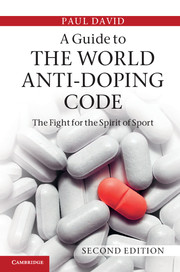Book contents
- Frontmatter
- Contents
- List of Figures
- Preface to the Second Edition
- Table of Cases
- Introduction
- 1 The development of principles relating to anti-doping regimes: the role of the Court of Arbitration for Sport
- 2 Overview of the Code and the World Anti-Doping Program
- 3 The International Standards in more detail
- 4 The nature of the Code and its interpretation and application
- 5 Articles 1 and 2 of the Code: anti-doping rule violations under the Code
- 6 Article 3 of the Code: the proof of anti-doping rule violations under the Code
- 7 Responsibility for testing and investigations, results management and hearings
- 8 Articles 9 and 10 of the Code: sanctions for anti-doping rule violations
- 9 Article 13: appeals under the Code
- 10 Appeals to the Swiss Supreme Court from CAS, challenges to the Code in the courts and claims outside the Code
- 11 The way ahead: review of the 2009 Code
- Index
- References
10 - Appeals to the Swiss Supreme Court from CAS, challenges to the Code in the courts and claims outside the Code
Published online by Cambridge University Press: 05 February 2013
- Frontmatter
- Contents
- List of Figures
- Preface to the Second Edition
- Table of Cases
- Introduction
- 1 The development of principles relating to anti-doping regimes: the role of the Court of Arbitration for Sport
- 2 Overview of the Code and the World Anti-Doping Program
- 3 The International Standards in more detail
- 4 The nature of the Code and its interpretation and application
- 5 Articles 1 and 2 of the Code: anti-doping rule violations under the Code
- 6 Article 3 of the Code: the proof of anti-doping rule violations under the Code
- 7 Responsibility for testing and investigations, results management and hearings
- 8 Articles 9 and 10 of the Code: sanctions for anti-doping rule violations
- 9 Article 13: appeals under the Code
- 10 Appeals to the Swiss Supreme Court from CAS, challenges to the Code in the courts and claims outside the Code
- 11 The way ahead: review of the 2009 Code
- Index
- References
Summary
Challenges to anti-doping regimes before the Code
Before the advent and adoption of the Code, legal challenges were made, from time to time, by athletes, to the enforceability of doping rules and regulations before national courts and before supranational tribunals and courts, such as the European Court of Justice. The challenges sought to invoke a range of arguments, which are united by the contention that the anti-doping rules in issue should not be enforced because they were contrary to the fundamental individual rights and freedoms which were protected by national or international constitutional provisions or by general principles of national and international law.
Fundamental rights such as the rights of the individual to work, to privacy, not to be punished without fault, and the right to equal treatment and not to be subjected to discrimination, protected by national legal rules, were relied on to challenge the enforceability of the strict liability ‘no fault’ regime common in anti-doping rules. Principles of competition law protecting individuals from anti-competitive conduct and agreements, and from restrictions on the freedom to work and provide services, and common law contractual principles protecting individuals from restrictions in restraint of trade, were also relied on to contend that periods of ineligibility should be set aside. Such challenges go beyond questions concerning the interpretation of the anti-doping rules in question (or, indeed, challenges to the fairness of the hearing process) and seek to set aside the provisions of rules on the ground that, while their terms may be clear and be the subject of agreement, they infringe overriding fundamental rights and should not, as a result, have legal effect.
- Type
- Chapter
- Information
- A Guide to the World Anti-Doping CodeA Fight for the Spirit of Sport, pp. 337 - 375Publisher: Cambridge University PressPrint publication year: 2013



